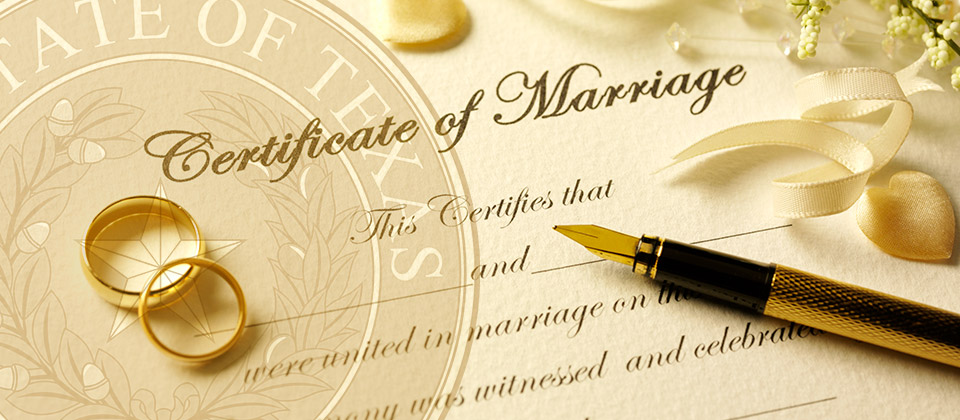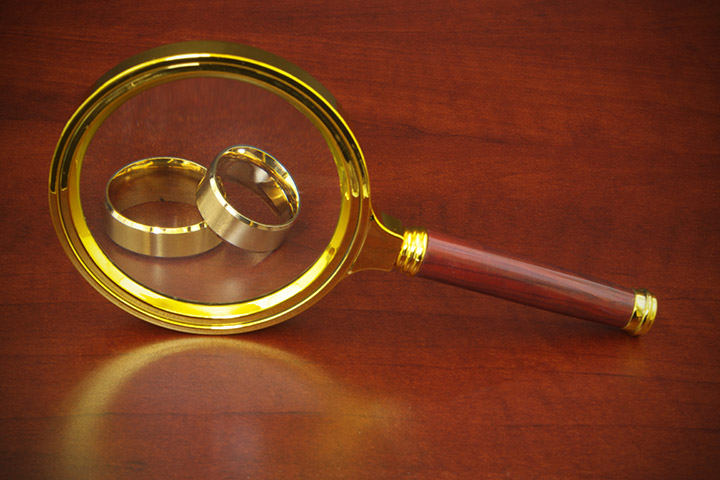Guide to Texas Marriage Records

A marriage ceremony is enough to showcase your relationship in front of friends and family; however, sweet recollections of your special day don't serve as concrete proof in the legal field. Married individuals must produce a marriage record before Texas organizations perform vital processes such as legal name changes or amending insurance plans.
These documents are managed slightly differently depending on the overseeing state and county. Learn how to locate your Texas marriage records quickly and easily!
What Are Texas Marriage Records?
The government keeps Texas marriage records to prove the legitimacy of a marriage. They're often mistakenly referred to as "marriage certificates", but this term is never used in the Texas Family Code and should be avoided when requesting the county office.

These documents are only meant to validate a marriage, so they don't include extensive personal information. The listed fields on marriage records aren't consistent in all Texas counties but will always have the following:
- First and last names of the married individuals
- Date of the ceremony
- County the ceremony took place
Generally, there's less information on Texas marriage records than in most other states. Some counties may record the witnesses' and officiant's names as well.
How Are Texas Marriage Records Stored?
Texas marriage records are kept at the Records Department of the issuing county. This means that if someone is wed in Tarrant County, they must visit an office in Tarrant County to receive a certified copy of their marriage record. In general, unofficial copies of marriage records can be found through Vital Records, but certified licenses cannot.
Marriage License
Anyone looking for Texas marriage records will often see the term marriage license thrown around instead. The terms are interchangeable; however, some state pages require couples to get a marriage license before the ceremony. Why?
Unlike a marriage record, which is always requested after the union is official, a marriage license has two forms.
At first, it serves as a permission slip from the county that allows a couple to be wed. However, once the witnesses and officiant sign it, this document is sent back to the clerk's office and filed as the official marriage license. Otherwise known as the marriage record.
There may be some confusion over this issue when ordering your marriage record from the county clerk's office. So, ensure you're clear with the representative that you're seeking a post-wedding marriage license.
Omitted Information and Errors
These records are public information in Texas, so you might be afraid that an identity thief could order yours for nefarious purposes. Rest assured that Texas Marriage Records are simple documents to confirm a marriage. They don't include sensitive data like the spouse's social security numbers, addresses, or contact information.
A more realistic danger is in errors and incorrect recordings on the document. Because marriage licenses are signed and filled out by regular citizens, errors like misspellings, wrong dates, or missing information are possible. These could impede future Federal processes or damage the legitimacy of your license.
Marriage Statistics in the State

Aside from a few cases, all states must send their marriage statistics to the Centers for Disease Control (CDC). These numbers help decide the course of federal and state-level programs that provide for spousal benefits and the general well-being of the population.
On the individual level, marriage statistics help couples understand what to expect, whether they're already married or not. They can gain insight into people's lives in similar situations by checking on the average marrying age, education levels, and divorce rates of people in their area.
Here are some of the collected marriage statistics in Texas:
- Marriage Rates: In 2021, Texas had a marriage rate of 5.8 per thousand citizens. This marriage rate puts Texas in the lower half of US states, sitting at number 28. While the overall score is low, it's still an improvement over the previous year's marriage rate of 5.3 and represents an overall upward trend for the state.
- Average Marrying Age: According to the US census, Texas has a lower median marrying age than the rest of the country. Men average an age of 27.5, and women tend to marry around 25.7 years old. This statistic is rising in Texas and may soon catch up to national numbers.
- Income and Education Levels: The rising marital age is likely tied to the desirability of education and income for partners. Men are more likely to marry with an income over $100,000, and the same is true for women making over $75,000. Pew Research has also found that college-educated men and women are more successful at maintaining long-term marriages.
- Divorce Rates: Texas's divorce rates have settled at around 10 percent for the past decade. Men tend to divorce at a lower rate than women, with the most cited reasons for divorce being insupportable marriage and adultery.
How to Find Texas Marriage Records

Marriage records are vital to processes like name changes, genealogical studies, divorce courts, and government financing. Others may put them in a decorative frame as a reminder of their special day (some counties offer special Heirloom Anniversary Certificates for this purpose).
Regardless of why you want your marriage record, you'll need to collect some information. If it's your marriage, you'll likely know everything off the top of your head, but if it's for a distant relative, a little research might be involved.
Depending on your needs, you have two options for whom to ask: online and offline.
Online
Many counties, such as Dallas County, offer online portals to order certified marriage records. These services have varying fees but shouldn't exceed $30 at the higher end. It's a straightforward process requiring a photocopy of your identification and the information in the previous section. You'll also have to prove that you have a legitimate interest in the record, which usually means being a close family member or representative of the listed spouses.
NOTE: Certified copies sent through online portals do not have an official raised seal. Certain entities could require this.
Online Verification
If you don't need a certified copy of your marriage record, you can place an online order through the State's Vital Records Division. Vital Records can send marriage verification letters confirming marriages after 1966.
Understand that verification letters aren't viable for many official legal processes like name changes or court matters. You'll require a certified record for those events. However, they may be enough for tasks like updating insurance policies or reporting to a company's HR department.
You must confirm beforehand that verification is enough for your purposes. You can order through this page and expect a 20–25-day turnaround period. Have the payment method ready, as a $20 fee is attached.
Offline
If you're going through a county that doesn't offer online ordering, you'll need to contact the county clerk's office that handled the license. Don't dread it too much, as there's far less traffic here than on a regular trip to the DMV.
Most Texas counties will offer three options for ordering: in-person, mail-in, and phone requests. This process has official forms, but most offices will accept informal documents so long as the necessary information is included.
Make sure to have the following:
- The date of marriage
- Full names of the bride and groom
- Credit or debit card
The clerk's office will charge a search fee, a processing fee, and a certification fee.
For both online and offline ordering, you must know the issuing county. This information can be difficult to remember if it's been a long time, but you can search the Texas Records Index to find the necessary details.
District Clerk Directory
The ordering process is relatively easy when you have the information on hand. Most of the biggest counties have online ordering portals, but you can call the county clerk directly if you're having difficulty. We've put their names and contact information in the table below.
FAQ on Marriage Records in Texas
How long will it take to get a copy of my marriage record in Texas?
Different counties in Texas have different processing speeds. When ordering through online portals, you can expect an email to arrive in 20-25 business days. If you require a faster turnaround time, consider visiting the clerk's office in person for same-day service.
Who can request marriage records in Texas?
Marriage licenses are public records in Texas. Anyone can request a copy if they have a valid reason or interest in the records. This group usually includes:
- Named Spouses
- Children
- Representative Attorneys with written proof of employment
- Other representatives, such as the executor of a will
These are typical examples, but there can be any number of reasons for requesting a marriage record that the clerk's office accepts. Even sealed records can be reopened with a court order.
How much does it cost to request a marriage record?
Marriage record requests come with a non-refundable search fee. This search fee may increase if you're missing some vital information that would reduce the search time.
Most counties don't charge more than $15 for the search fee but also charge varying processing and shipping fees. Applicants can expect to pay anywhere from $20 to $40 for a certified marriage record.
The Texas Vital Records Division also charges $20 for a marriage verification. If you want a rush order, you can pay an additional $17.50 for expedited, overnight shipping.
How much does a marriage license cost?
Texas marriage licenses have a base cost of $60 statewide. Couples can attend a pre-marital education course to reduce this fee to $21, and military personnel scheduled for hostile deployment can have the fee waived entirely.
Can I request an online or digital copy of a marriage record?
Many populated counties offer online portals that streamline the marriage record request process. You can use these portals as long as you know the spouses' names, the ceremony's date, and the issuing county.
These services will email you a certified copy of your marriage record, but it will lack the raised seal, which adds another layer of proof of authenticity. Confirm that the raised seal isn't required for your purposes.
